- Apply for Authority
- P-ISSN2765-2203
- E-ISSN2765-2211
- KCI Candidate
Latest Articles
Vol.5 No.2
6papers in this issue.

Abstract
This study used a GPS tracker to determine characteristics of wintering habitat use by black-tailed gulls on the west coast of Korea. Results of this study showed a southward movement in December and a northward movement in March. The wintering habitat was confirmed to include the southwest coastal island area (Group 1), the inland coastal area (Group 2), and China (Group 3). The wintering home range was the narrowest in October and the widest in December. Home range of Group 1 was increased from November, showing the maximum in December, decreased in February, and then tended to increase again in March. Group 2 showed the widest home range in November and a narrow range of home range from December. Home range of Group 3 showed a mixed pattern of group 1 and group 2. The flight rate was the lowest in January and the highest in March. Day and night flight rates showed significant differences by month. This study identified wintering characteristics of the West Coast population of black-tailed gulls on the West Coast, including their wintering areas, migration periods, and use patterns. These wintering characteristics of black-tailed gull in the west coast area are thought to be affected by environmental factors (such as food resources and fishing activities) and geographical characteristics of the West Coast where many islands are distributed.


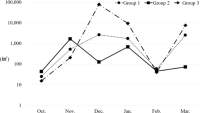
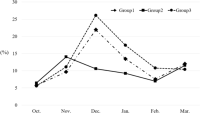
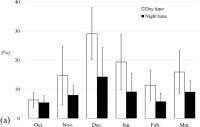

Abstract
Ecological monitoring provides indispensable data for biodiversity conservation and sustainable resource management. However, the complexity and variability inherent in ecological monitoring data necessitate robust verification processes to ensure data integrity. This study employed Benford's Law, a statistical principle traditionally used in fields such as finance and health sciences, to evaluate the authenticity of ecological monitoring data related to the abundance of migratory bird species across various locations in South Korea. Benford's Law anticipates a specific logarithmic distribution of leading digits in naturally occurring numerical datasets. Our investigation involved two stages of analysis: a first-order analysis considering the leading digit and a second-order analysis examining the first two digits of bird population counts. While the first-order analysis displayed moderate conformity to Benford's Law that suggested overall data integrity, the second-order analysis revealed more pronounced deviations, indicating potential inconsistencies or inaccuracies in certain subsets of the data. Although our data did not perfectly align with Benford's Law, these deviations underscore the complex nature of ecological research, which is influenced by a multitude of environmental, methodological, and human factors.





Abstract
On August 21, 2023, the National Institute of Ecology reported the sighting of an invasive slug resembling Limax maximus Linnaeus, 1758. near Bambat Tree Frog Park, Suwon-si, Korea. This slug is known for its aggressiveness. Specimens were collected around the park and from nearby farms. Through barcoding analysis and sequence comparison, it was identified as L. maximus, confirming its presence in Republic of Korea, alongside two previously identified Limax species, Limax flavus Linnaeus, 1758 and Lehmannia marginatus O. F. Müller, 1774. This study represents the first documented report of L. maximus in the country.




Abstract
The remarkable economic growth achieved in the modern era has revitalized various industries, including pet trade. More than 2,000 species of non-native species have been introduced to South Korea and approximately 7.7 tonnes of alien turtles are imported annually. Turtles belonging to the family Kinosternidae. They are mostly small and popular pets, although they are designated as Convention on International Trade in Endangered Species of Wild Fauna and Flora (CITES) species. In the present study, we present the first two species of musk turtles found in the wild in South Korea. On April 5, 2023 and July 8, 2023, an eastern musk turtle (Sternotherus odoratus) and a razorbacked musk turtle (Sternotherus carinatus) were captured in Ilsandong-gu, Goyang-si, Gyeonggi-do and Jung-gu, Daejeon, respectively. The carapace length was 88.6 mm for S. odoratus and 105.68 mm for S. carinatus. They were identified based on their morphological characteristics and mtDNA cytochrome b gene. These turtles were found in waterfront areas with over 1.4 million annual visitors. Both sites were found to have threatened amphibians and reptiles. There is an urgent need to continue monitoring and conducting risk assessments for the protection of endemic species in Korea.

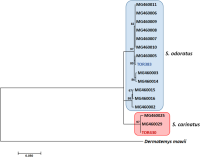

Abstract
Hitchhiker insect species from international vessels entering Korea in 2022 were monitored. A total of 947 samples of hitchhiker insects were collected using a simple collection method by hand. Among them, 856 individuals were classified as 374 species of 86 families in 10 orders through integrative analysis with DNA barcoding and morphological examination. The rest 91 individuals were identified only to the family level. As a result of examining the distribution of the 374 species (856 individuals), 38 species (71 individuals) were confirmed as not-distributed species in Korea, including six species (11 individuals) as ‘regulated species’ listed by the Korean Animal and Plant Quarantine Agency. Of 38 not-distributed species, 10 species were detected multiple times (at least twice). Accordingly, it is necessary to strengthen monitoring of the area around the port of entry along with continuous surveillance to prevent invasion of species detected multiple times. For monitoring alien hitchhiker insect species, this study provided detection information and biological data for alien species.

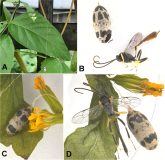
Abstract
The genus Charops is one of the small genera of the subfamily Campopleginae with 30 species reporded worldwide. All of the known host insects of Charops striatus belong to the lepidopteran family Zygaenidae, perceived as harmful. C. striatus, one of the endoparasitoids from Elcysma westwoodi, is the most damaging lepidopteran pest of Prunus yedoensis. In South Korea, host plants of C. striatus were reported by Choi & Lee in 2008. In this paper, two new host plants, Crepidiastrum denticulatum and Zea mays, of Charops striatus are reporded for the first time from South Korea. Digital images and redescription of this species are provided.

Notice
- Data does not exist.

